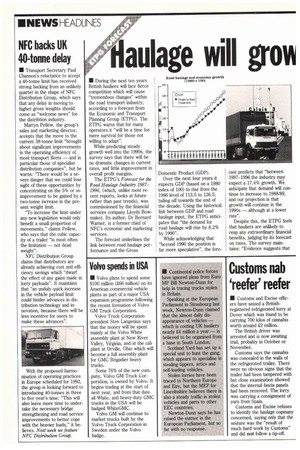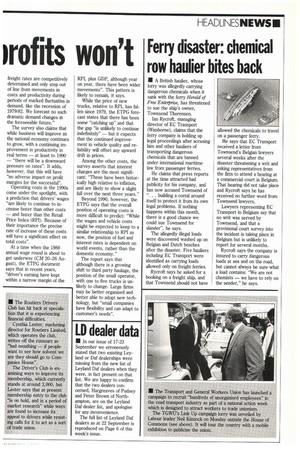Haulage will grovi wofits won't
Page 6

Page 7

If you've noticed an error in this article please click here to report it so we can fix it.
• During the next ten years British hauliers will face fierce competition which will cause "tremendous changes" within the road transport industry, according to a forecast from the Economic and Transport Planning Group (ETPG). The ETPG warns that for many operators it "will be a time for mere survival for those not willing to adapt".
While predicting steady growth well into the 1990s, the survey says that there will be no dramatic changes in current rates, and little improvement in overall profit margins.
The ETPG's Forecast for the Road Haulage Industry 19871996, (which, unlike most recent reports, looks at future rather than past trends), was commissioned by the financial services company Lloyds Bowmaker. Its author, Dr Bernard Warner, is a former chief of NFC's economic and marketing services.
The forecast underlines the link between road haulage performance and the Gross Domestic Product (GDP).
Over the next four years it expects GDP (based on a 1980 index of 100) to rise from the 1986 level of 113.5 to 126.5, tailing off towards the end of the decade. Using the historical link between GDP and road haulage input, the ETPG anticipates that "the demand for road haulage will rise by 8.2% by 1990".
While acknowledging that "beyond 1990 the position is far more speculative", the fore cast predicts that "between 1987-1996 the industry may expect a 17.4% growth. We anticipate that demand will continue to increase to 1988/89, and our projection is that growth will continue in the 1990s — although at a lower rate", Despite this, the ETPG feels that hauliers are unlikely to reap any extraordinary financial benefits, judging by its forecast on rates. The survey maintains: "Evidence suggests that freight rates are competitively determined and only step out of line from movements in costs and productivity during periods of marked fluctuatins in demand, like the recession of 1979/82. We forecast no such dramatic demand changes in the foreseeable future."
The survey also claims that while business will improve as the national economy continues to grow, with a continuing improvement in productivity in real terms — at least to 1990 — "there will be a downward pressure on rates". It adds, however, that this will have "no adverse impact on profit margins for the successful".
Operating costs in the 1990s come under the spotlight, with a prediction that drivers' wages "are likely to continue to increase faster than other costs — and faster than the Retail Price Index (RPI). Because of their importance the precise rate of increase of these costs will have a significant effect on total costs".
At a time when the 1988 annual wage round is about to get underway (CM 20-26 August), the ETPG document says that in recent years, "driver's earning have kept within a narrow margin of the RPI, plus GDP, although year on year, there have been wider movements". This pattern is likely to remain, it says.
While the price of new trucks, relative to RPI, has fallen since 1979, the ETPG forecast states that there has been some "catching up" and that the gap "is unlikely to continue indefinitely" — but it expects that the continued improvement in vehicle quality and reliability will offset any upward drift in prices.
Among the other costs, the survey asserts that interest charges are the most significant: "These have been historically high relative to inflation, and are likely to show a slight fall over the next three years."
Beyond 1990, however, the ETPG says that the overall position of operating costs is more difficult to predict: "While the wages and vehicle costs might be expected to keep to a similar relationship to RPI as now, the position of fuel and interest rates is dependent on world events, rather than the domestic economy."
The report says that although there is a growing shift to third party haulage, the position of the small operator, with one to five trucks is unlikely to change. Large firms may be better organised and better able to adopt new technology, but "small companies have flexibility and can adapt to customer's needs".




































































































































